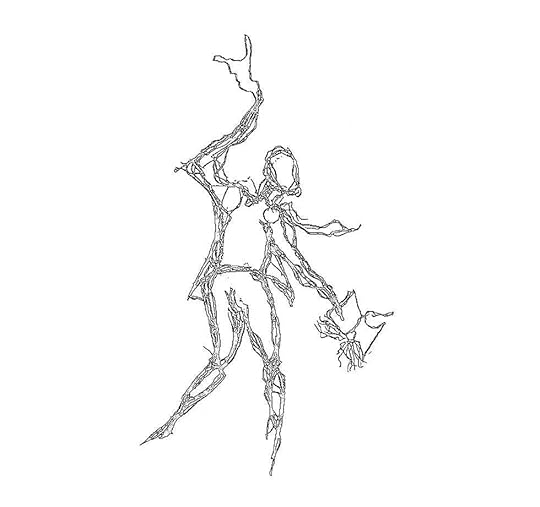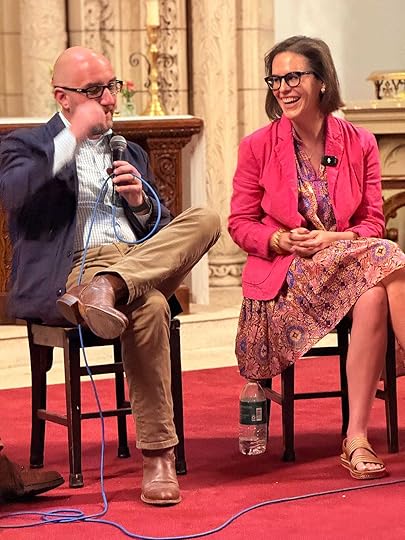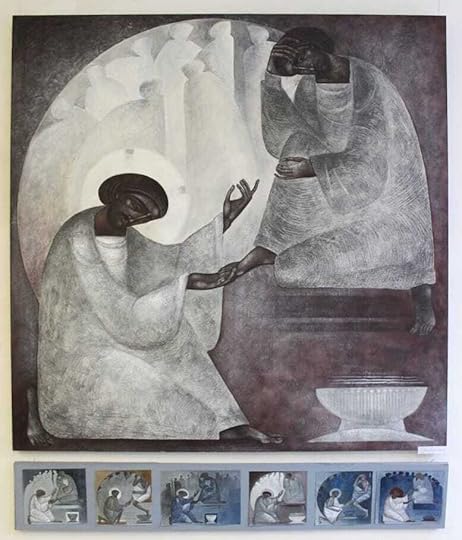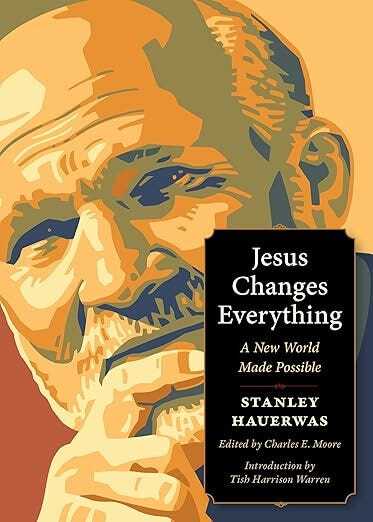Jason Micheli's Blog, page 10
May 16, 2025
Holiness Is Who You Follow

If you appreciate the work, pay it forward. Literally! Become a paid subscriber.
This winter I preached a series of sermons on Psalm 23. To reflect upon King David’s most famous prayer, I reread the scriptures’ narrative account of his life, spread across 1 and 2 Samuel and into the Book of Kings. Fleming Rutledge has long argued that before preachers preach on a passage of scripture, they ought to read the entire biblical book which surrounds the passage. I had not heeded this counsel with regards to David until this year.
Reading his story in its entirety, I noticed how the whole narrative is essential to determine, and so proclaim, the meaning of a discrete episode; specifically, David’s response to the reproachful curses he receives at Bahurim. In 2 Samuel 16, David is the victim of a coup d'état orchestrated by his son Absalom. David is on the run and, entering the town of Bahurim, a man loyal to the king David had previously deposed, encounters.
The man’s name is Shimei. He hurls curses and casts stones at David as the deposed king passes by him. Shimei remembers David’s violence and speaks out of a confidence that the LORD remembers his sins as well:
“Get out, get out, you man of blood, you worthless man! The Lord has avenged on you all the blood of the house of Saul, in whose place you have reigned, and the Lord has given the kingdom into the hand of your son Absalom. See, your evil is on you, for you are a man of blood.”
Shocked by Shimei’s shameful candor, Abishai says to David, “Why should this dead dog curse my lord the king? Let me go over and take off his head.”
But David responds with humble piety:
“But the king said… If he is cursing because the Lord has said to him, ‘Curse David,’ who then shall say, ‘Why have you done so?’ Behold, my own son seeks my life; how much more now may this Benjaminite! Leave him alone, and let him curse, for the Lord has told him to. It may be that the Lord will look on the wrong done to me, and that the Lord will repay me with good for his cursing today.”
Or rather, David responds to Shimei’s physical rocks and verbal arrows with what appears to be a humility rooted in faithfulness. But the scriptures remember his name as Shimei because David remembered his name. David did not forget Shimei.
David did not entrust Shimei’s torments to the LORD.
David did not love his enemy.
He did not turn the other cheek.
He waited.
May 15, 2025
Relief. Period.

If you appreciate the work, pay it forward. Literally! Become a paid subscriber.
Hi Friends,
Here is the audio recording of the panel on which I spoke at the Mockingbird Conference in NYC. Other leaders from the Iowa Preachers Project (Ken, Ryan, and Sarah) joined me.
Applications are open for next year’s cohort. Check it out HERE.
Here’s the audio:

 Get more from Jason Micheli in the Substack appAvailable for iOS and AndroidGet the app
Get more from Jason Micheli in the Substack appAvailable for iOS and AndroidGet the app
May 14, 2025
"She Really Believes We Need Saving"

If you appreciate the work, pay it forward. Literally! Become a paid subscriber.
Teer, Tony, Will, and I recently sat down to discuss our mutual appreciation for the preaching and writing of our friend Fleming Rutledge.
In case you missed it, Wycliffe College is sponsoring an event in Fleming’s honor in June at St. Barnabas Episcopal Church in Greenwich, Connecticut. The details are HERE if you’d like to join us.
Show NotesSummary
This conversation explores the art of preaching, focusing on the influential work of Fleming Rutledge. The speakers discuss the importance of keeping Jesus at the center of sermons, the impact of cultural context on theology, and the necessity of recognizing sin and redemption in preaching. They also delve into the differences between proclamation and apologetics, the role of evil, and the unique style of Rutledge's preaching that challenges contemporary theological perspectives.
Takeaways
Fleming Rutledge emphasizes keeping Jesus at the center of preaching.
Theocentric sermons focus on God rather than human experience.
Cultural context significantly influences theological perspectives.
Sin and redemption are central themes in effective preaching.
The agency of God is crucial in understanding salvation.
Liberal theology often downplays the need for salvation.
Fleming's preaching style is both gracious and challenging.
Evangelical preaching should focus on proclamation rather than self-improvement.
Understanding the gospel is not the primary goal of preaching.
Fleming's strong Christology informs her approach to evil and redemption.
Sound Bites
"Keep Jesus the main thing."
"She really believes we need saving."
"Her sermons are deeply challenging."
 Get more from Jason Micheli in the Substack appAvailable for iOS and AndroidGet the app
Get more from Jason Micheli in the Substack appAvailable for iOS and AndroidGet the app
May 13, 2025
We're Either Waiting for Nothingness or We're Waiting for Jesus

If you appreciate the work, pay it forward. Literally! Become a paid subscriber.
Exactly because the gospel reports a story (“The crucified one lives!”) abstractions (e.g., love) are anathema to it.
The lectionary Gospel passage assigned for the Fifth Sunday of Easter is John 13.31-35.
The context is the foot-washing on the evening before Good Friday when, in John’s Gospel, dies on the Passover. In verse 34, Jesus commands his disciples:
“A new command I give you: Love one another. As I have loved you, so you must love one another.”
This exhortation is often taken to represent the distillation of the Christian faith. Jesus even appears so to summarize discipleship, commenting in the following verse, “By this everyone will know that you are my disciples, if you have love for one another." However, while love is undeniably a chief mark of the Christian life and a defining attribute of Christ’s body, the absence of which is a sign of faith’s impoverishment and the Spirit’s neglect, love it is not the totality of the gospel about Christ.
May 11, 2025
A Conspiracy of Kindness

If you appreciate the work, pay it forward. Literally! Become a paid subscriber.
For Eastertide, we’re doing a short sermon series on the Book of Ruth. Here is my offering on Ruth 2.
In the Gospel of John, Jesus is in the middle of teaching a multitude when some scribes and Pharisees drag a woman through the crowd. Someone— presumably her cuckolded husband— has caught the woman in flagrante delicto.
She is guilty.
And the commandments are clear.
She is not a teaching object.
She is a trap.
They attempt to put Jesus in their crosshairs by reminding him in front of the crowd, “Teacher, this woman has been caught in the act. Now the scriptures command us to stone such women. What do you say?”
Jesus refuses to respond with the immediacy they demand. Jesus will not grant the moment the emergency they decree. Instead, like a child at ease and with all the time in the world, he bends down to the ground and he begins to draw in the dirt. With his finger. His lack of urgency only exacerbates their righteous anger; “they continued to ask him their questions,” John understatedly reports.
“Teacher, what do you say?”
“Settle it, Jesus.”
“Should we or should we not?”
Finally, his finger-painting nearly finished, Jesus stands up and offers an invitation, “Let him who is without sin among you be the first to throw a stone at her.” And then Jesus kneels back down in the dirt, more absorbed in a fleeting drawing which foot traffic will disappear than he is interested in her sin.
“If you think you’re sinless, by all means— go right ahead; there’s plenty of rocks lying around.”
One by one the crowd dissipates, refusing to give the indignant scribes and Pharisees the audience they desired. Finally, after all the multitude that had gathered around him departs, Jesus looks up from his impromptu art project and he asks her, “Woman, where are they? Has no one condemned you?”
The adulteress replies to Jesus, “Not a single one.”
Not one of them reached for a rock.
That’s…remarkable?
As soon as she accompanies her mother-in-law Naomi back to Bethlehem in time for the barley harvest, Ruth is immediately identified twice as a Moabite. It’s no wonder she bears the only name in the book whose meaning is not clear. Naomi means “sweet;” just so, the name she takes in her widowhood, Mara, means “bitter.” Elimelech, Naomi’s dead husband, means “my God is king.” Boaz, Bethlehem’s benefactor, his name means “strength.”
But Ruth?
The meaning of her name is ambiguous.
Because she is a foreigner.
Because she is from Moab.
And precisely because she is from Moab— no less than when the woman caught in adultery is cast before the Nazarene’s crowd— when Ruth goes forth to glean ears of grain in Bethlehem’s fields, we should all be holding our breath. Because Ruth is in danger.
Because Ruth is from Moab.
After all, the very same biblical commandments that provide for the poor and the widow and the immigrant to collect food from the edges of Israel’s fields, prohibit God’s people from extending any aid and comfort whatsoever to a Moabite.
Why does the law draw such a stark line against someone like Ruth?
Just as Bethlehem means “house of bread,” Moab means “from Dad.” A morally disparaging derivation, the Moabites are the descendants of Lot’s incestuous union with his oldest daughter. Actually, today we’d say the daughter date-raped the Dad. Birthed in scandal, the Moabites soon developed a reputation for unspeakable wickedness. For instance, when the Israelites fled from slavery under Pharaoh, they sought bread and water from the Moabites— just bread and water, nothing more. Not only did the Moabites give them neither but they also hired a prophet to genocide the Israelites. Still worse, the Moabites worshipped Chemosh, another name for Moloch— a pagan deity who desired child sacrifice.
The Moabites were worse than strangers and outsiders.
Thus in the Book of Deuteronomy the LORD commands his people not give aid or comfort to the Moabites— to the tenth generation.
When Naomi first sets out from Moab to Bethlehem, she says to Ruth, “Go, return to your mother’s house. May the LORD deal kindly with you, as you have dealt with me.” Naomi attempts to dissuade her daughter-in-law from following her to Bethlehem not simply because the old widow has foreclosed any hope for her own future. Naomi has no reason to believe that Ruth, Moabite Ruth, will receive anything but scorn and condemnation in Bethlehem.
If you know the scriptures— and Ruth knows Naomi’s Bible well enough to know they permit the desperate and hungry to glean for food— then you know what a momentous risk to her personal safety Ruth takes when she leaves Naomi and sets out for the fields.
Ruth may as well be caught in adultery as be a Moabite in Bethlehem.
But instead of a single stone cast her way, Ruth finds only blessing.
“Teacher, what do you say?” the scribes and the Pharisees press.
And Jesus responds by kneeling down in the dirt, as if what he wants the accused woman to see is not him but the community gathered around him, the multitude he has been teaching. After that multitude departs, Jesus says to her, “Neither do I condemn you.”
Scripture says no more about the woman caught in adultery.
Critically—Just as we do not know her, she did not know Jesus.We read the near-stoning incident in John 8 as a revelation of Christ. In refusing to condemn the cuckolding woman, we think Jesus is revealing the merciful heart of Israel’s LORD and that’s not wrong; it’s just not what the woman knows. She has no notion of the man to whom the accusers bring her. She knows not that Mary’s boy is the Father’s only begotten Son. In the very next chapter, all the man (who had been born blind) can say of Jesus is, “I don’t know who he is. All I know— he put mud on my eyes, I washed, and now I see.” The woman caught in adultery doesn’t know any more than the man born blind. As far as she knows, the scribes and the Pharisees have brought her to one just like them.
She does not know him.
And therefore, the pardoned woman’s astonishment is not that she has met the LORD who showed her mercy. The woman’s shock is that— being dragged there in condemnation— she chanced upon an entire community all of whom resisted the letter of the law.
Not one of them grasped for a stone.
We read this passage as a story about Jesus— and rightly so, but from the woman’s perspective it’s not that she met the messiah. It’s that she encountered a surprising community. Caught in the act, they pulled her from the bed, dragged her through the city— probably naked, and they thrust her into the midst of a small group gathered around this rabbi.
And not a single one of them reached for a rock.
That’s…remarkable?
Instead of stones cast her way, Ruth finds only blessing.
Rather than curses, Ruth finds herself the object of a conspiracy of kindness.
When Boaz arrives from the city to his land outside Bethlehem, he invites Ruth to leave the edges of the field and to reap in the field alongside his servants. With no transactional expectation, Boaz offers Ruth to gather up not the tiny ears of the grain but the more abundant sheaves. He instructs her to drink from his own supply of water. Where her people had refused his people bread and water during the exodus, Boaz gives Ruth bread and wine and roasted grain at lunch. Ruth sits among the reapers during the meal, and they pass her food like she was part of the family. Though she is single and vulnerable, Boaz's men do not threaten her. While Ruth is young and beautiful, his maidservants do not scorn her. And at the day’s end, Ruth returns to Naomi with over half a bushel of barley.
Not only do the people of Bethlehem not cast any stones, they do not even use words to do violence to Ruth.
Notice, verse five— when Boaz arrives from Bethlehem to his fields and asks “Whose is this young woman?” his foreman in charge of the reapers is not short on details.
He informs Boaz:
“She is the young Moabite woman, who came back with Naomi from the country of Moab. The Moabite woman said, “Please let me glean and gather among the sheaves after the reapers.” So she came, and she has continued from early morning until now, except for a short rest.”
The little town of Bethlehem has been talking. The grape vine has been as busy as the grain harvest. But their grape vine is not like our grape vine so often is. They know Ruth’s whole story. But the community has been spreading only "good gossip” about Naomi’s Moabite kin.1 They have spoken about Ruth merely what is good and true. They have not slandered her. They have not preemptively judged or shunned her. Not a single member of the community has stirred up any enmity towards her even though their scriptures and their history justify such antagonism.
In fact, at the end of the story— spoiler alert— when Boaz makes this Moabite widow his bride, scripture says every last member of the community in Bethlehem blesses their wedding. Just as no one remains to condemn the woman brought to Jesus, no one misses out on blessing Ruth’s marriage to Boaz. Every item on the Crate and Barrel registry is purchased and gift wrapped. The whole community gathers at the city gate and declares, “We are witnesses. May the LORD make the woman, who is coming into your house, like Rachel and Leah, who together built up the house of Israel.”
From beginning to end, no one in Bethlehem shows any hostility to Ruth. Indeed, the Book of Ruth is unique in the Bible (and possibly in all of literature) in that the story contains no antagonist. There are no bad guys in the Book of Ruth. There is drama in the Book of Ruth, but there is no conflict. In Bethlehem, there are only good, gracious people, only people who bless; as though, Bethlehem is a little kingdom of kindness-conspiring priests.
Given that the story takes place during the time of the judges— it’s more than a nice story.It’s…remarkable?
In 2006 the Irish poet Seamus Heaney suffered a debilitating stroke, a blow which dealt him a devastating new awareness of his own vulnerability. The stroke’s aftermath frustrated the poet’s ability to conjure words. It also made him acutely aware of his dependence on others— nurses, doctors, family, neighbors, and friends—for basic physical needs. In interviews, Seamus Heaney spoke often of the profound sense of being carried, not just emotionally but physically carried, by others— carried from one place to the next.
Heaney’s stroke led him to write a poem for a 2010 collection entitled, Human Chain. In the poem, Heaney interprets the scene recorded in the Gospel of Mark in which the friends of a paralyzed man dig a hole through the roof when they cannot get their crippled friend through the crowd to the one with the power to heal him.
In his brief poem on the Gospel of Mark, Seamus Heaney writes:
“Not the one who takes up his bed and walks
But the ones who have known him all along
And carry him in —
Their shoulders numb, the ache and stoop deeplocked
In their backs, the stretcher handles
Slippery with sweat. And no let-up
Until he’s strapped on tight, made tiltable
And raised to the tiled roof, then lowered for healing.
Be mindful of them as they stand and wait
For the burn of the paid-out ropes to cool,
Their slight lightheadedness and incredulity
To pass, those ones who had known him all along.”
Seamus Heaney titled the poem “Miracle.”
Just as the title is the key to Heaney’s poem, the first verse of the Book of Ruth is the interpretative matrix to the whole story, “In the days when the judges ruled…” The first verse of Ruth is a continuation of the concluding verse from the Book of Judges which comes before it, “In those days there was no king in Israel, and everyone did what was right in his own eyes.” In the table of contents, Ruth comes after Judges, but in time the story of Moabite Ruth finding nothing but blessing in Bethlehem occurs during the period of the judges.
In case you don’t know:
The Book of Judges is the most horrific in all the scriptures because the time of the judges was the most horrible in all of Israel’s history.For example:
Seventy miles from the fields Ruth gleans in Bethlehem, the judge in Gilead, Jephthah, foolishly vows to sacrifice whatever comes out of his house first if he is victorious in battle. Thus when Jephthah’s daughter steps out to welcome her father, he sacrifices her as a burnt offering. Seventy-five miles from the House of Bread, a paranoid judge named Abimelech murders seventy members of his house, including all his children, in order to secure his grip on power. Eighty-three miles from Boaz’s threshing floor, in the Jezreel Valley, the judge named Gideon defeats the pagan Midianites only to become himself the oppressor and fall prey to idolatry himself. Twenty miles from the little town of Bethlehem, Samson slaughters one thousand with the jaw bone of an ass. In Gibeah, Benjamites brutally rape the concubine of a Levite— it’s the most terrifying text in the Bible. And in response, hoping to ignite a violent retaliation, the Levite dismembers her dead body and dispatches the remains to all the other tribes of Israel. The Levite’s vengeful plot works and the ensuing civil war leaves only six hundred survivors in Gibeah.
But only twelve miles away, in Ruth’s new home, when Boaz arrives at his fields from Bethlehem, he greets his reapers with the blessing of Aaron from Numbers 6, “The LORD be with you!”
The scriptures have not been forgotten by Boaz.And upon greeting them, the reapers in the fields respond in kind, “May the LORD bless you!” This is not an incidental or unimportant exchange. These are not quaint or precious greetings. This is a liturgy of blessing.2
And somehow, with the whole world seemingly going to hell, during the time of the judges, this biblical back-and-forth of beatitude is still alive and conforming a community a dozen miles from Gibeah.
And in the field when Ruth is knocked back by Boaz’s grace and kindness, the question she asks him is the very same question the grieving Hagar asks after Abraham and Sarah have exiled her and her son Ishmael away, and she is surprised by none other than the LORD Himself. “Why have I found favor in your eyes,” she asks, “that you should take notice of me, since I am a foreigner?” Ruth speaks to Boaz as Hagar does to God. In other words, Boaz sees her as God sees.
The LORD be with you.
May the LORD bless you.
Why have I, a foreigner, found favor in your sight?
Like friends alongside a stretcher, these are such small, mundane details.
It’s easy to miss the handiwork they reveal.
———————
Last week, I spoke on a panel at the Mockingbird Conference in New York City. On the way to the restroom Friday morning, I ran into a woman named Debbie (with an —ie). I preached to Debbie’s congregation in California several years ago and now— thanks to the difference in time zones— she worships with us online before she heads to her own church. I stepped past the registration table towards the men’s room when Debbie pulled at the arm of my blazer from behind.
“Jason,” she exclaimed, “I wondered if you’d make it here!”
Her large round glasses were perched on top of her head and her grab bag full of conference swag hung from her forearm. She smooshed my hat against my chest as she hugged me.
“I’ve been praying for you,” she said, “Look at you! You look so healthy and fit, no one would ever know you have cancer.”
I smiled and nodded.
“It’s a miracle,” she said uncomfortably loud.
I blushed, balking at her assertion.
“I don’t know that I’d call it a miracle,” I hedged, “The new chemotherapy drugs are amazing but the last few months have been pretty ordinary— nothing miraculous.”
She frowned. And then she put on her glasses, as if to verify I was not an altogether different person.
“What do you mean “nothing miraculous?” You’re here aren’t you? You’re alive when you didn’t you would be alive. What else do you call it?”
“I just meant,” I hemmed, “If you look back over my life this past year, you wouldn’t see any hand of God kind of moment, nothing extraordinary.”
“What kind of preacher are you? How else do you think God works miracles but in ordinary ways? How in the world is your life any different than the tree that drinks up the light?
And then she braced me, each of her hands on either of my forearms, and, looking me dead in the eyes, she said, “Remember this, Jason, the next time you start doubting the miracle-making in your life: God does not need our attention; he does not need to be noticed.”
“Why have I, a foreigner, found favor in your sight?”
During a time when others do whatever is right in their own eyes, Boaz sees with the sight of God.
You see—
The Book of Ruth is not simply a nice, sweet story.It is a miracle story!Seventy miles from Shechem, twelve miles from the Levite concubine’s corpse, twenty miles from Samson’s slaughter, here are a people committed to the kindness and wisdom of their faith. Here are people practicing liturgies of blessing. Here is a community with God’s own vision. No matter what is going on in the world around them, this is a community living the will of God in everyday, ordinary ways.
They are as mysterious as a tree drinking up the light.
The Book of Ruth is not a meet-cute.
It is a miracle!
When the prophet Elijah slumps over beside a broom tree and laments to the LORD that he is the only faithful one left in Israel, God chastises him that while Elijah has been busy battling the prophets of Baal, the LORD has been quietly creating and nurturing faith in over seven thousand other Israelites.
Likewise—
When the Book of Judges concludes with the grim, sweeping indictment that in the days when there was no king, everyone did what was right in their own eyes, the Book of Ruth rushes in to rebut. “Not everyone! Not everybody! No matter what the headlines read, the LORD has been busy. In Bethlehem.”He has been working miracles.God does not need our attention.
God does not need to be noticed.
“God creates from no need. God redeems from no need. God perfects from no need. God has no ego.”3 He does not need our attention; therefore, if we are going to see him at work in the world, we have to pay attention.
For example—
Just last Sunday, I sat behind the pulpit as my friend Todd preached and I watched as Ted Torsch (Ted, who every Tuesday copies and mails the Sunday sermon to our shut-ins) listened to the sermon and then— in real-time— preached a different sermon on that sermon to Randy, who had come to worship drunk and was weeping and near drowning in self-loathing.
That’s not just a sentimental story.
A year ago this week, I stood in the atrium and I watched through the glass, as transfixed as at any movie theater, as Mike Moser, already dying of lung cancer, his sweatpants hitched up to his armpits— I watched as he stubbornly struggled to shovel out a grave for the body of a person he never knew.
It’s not simply a nice story.
Brad Todd!
Politically-speaking, Brad is somewhere to the right of the Ayatollah. Nearly every day every week, he is on CNN espousing views with which approximately half of you disagree. Nevertheless! Not a one of you has done anything but bless him.
Given the days in which we live, that’s more than remarkable.
God does not need our attention.Just so—If we are going to see him at work in the world, we have to pay attention.For instance—
One of you, a former fundraiser for the Republican National Committee, provided the down-payment and first year’s rent for an apartment to house a refugee family sponsored by this church.
A family who has another baptism on the way.
It’s just a detail in a ledger.
But it’s a miracle.
Look—
Let’s face it.
You don’t need me to cite the news sources.
In our days, there are far too many who do whatever is right in their eyes.
The news from all around us is not good.
By sight alone, the times are dark.
And yet!
The loaf and the cup are evidence.
The LORD is busy otherwise.
So come to the table.
And before you do.
And after you do— for God’ sake
Pay attention.
 Get more from Jason Micheli in the Substack appAvailable for iOS and AndroidGet the app1
Get more from Jason Micheli in the Substack appAvailable for iOS and AndroidGet the app1Chris E.W. Green
2Green, The Fire and the Cloud.
3ibid.
May 10, 2025
Marjorie Taylor Greene: Protector of the Gospel
If you appreciate the work, consider becoming a paid subscriber.
Joseph wanted to talk about the valiant effort of congressional Republicans to defend the right of Christians to insist that “Jews killed Christ.”
After you remove your palm from your face, you can check out the articles he sent me:
Gop Alters Antisemitism Bill After Christian Conservatives Object – The Forward59.1KB ∙ PDF fileDownloadDownloadBill Banning Antisemitic Speech Protects Claims Jews Killed Jesus | Politics1.34MB ∙ PDF fileDownloadDownload Get more from Jason Micheli in the Substack appAvailable for iOS and AndroidGet the app
Get more from Jason Micheli in the Substack appAvailable for iOS and AndroidGet the app
May 9, 2025
Preaching Under Diminished Strength

If you appreciate the work, pay it forward. Literally! Become a paid subscriber.
Hi Friends,
Two quick updates:
I was only at the Mockingbird Conference in NYC for a hot minute, but it impressed upon me that a number of you are public proclaimers of the gospel. Applications are now open for the next cohort of the Iowa Preachers Project. Ken Jones and I will be back. Plus, we’re adding our friends Sarah Hinlicky Wilson and Sarah Condon as small group leaders. Apply!
I will be speaking at this event in honor of my mentor and muse, Fleming Rutledge— June will mark the 50th anniversary of her ordination as one of the first female priests in the Episcopal Church. HERE is the schedule. If you want to join us, do. I’ve already got one taker for a road trip. Let me know.

Finally, here is a conversation I shared with Will Willimon and Chris Green on the theology and practice of preaching.
 Get more from Jason Micheli in the Substack appAvailable for iOS and AndroidGet the app
Get more from Jason Micheli in the Substack appAvailable for iOS and AndroidGet the app
May 7, 2025
Tabitha is Risen Indeed?!

If you appreciate the work, pay it forward. Literally! Become a paid subscriber.
Miracles reveal something of God’s nature.
Acts 9:36-43
In the Book of Acts, after Philip baptizes a eunuch bound for Ethiopia and just after the Risen Jesus commandeers Saul and bequeaths him a new name, the Spirit-emboldened Peter does what only God can do. Arriving in Joppa, Peter raises a dead disciple to new life. She was— is— named Tabitha. The passage recalls the urgent S.O.S. the sisters of Lazarus had sent to the LORD, “Since Lydda was near Joppa, the disciples, who heard that Peter was there, sent two men to him with the request, "Please come to us without delay." Washed and laid to rest in an upper room, a group of widows lead Peter to Tabitha’s corpse. Peter ushers them all outside.
Then Luke reports:
“Peter knelt down and prayed. He turned to the body and said, "Tabitha, get up." Then she opened her eyes, and seeing Peter, she sat up. He gave her his hand and helped her up. Then calling the saints and widows, he showed her to be alive.”
Tabitha is risen indeed!?
The challenge posed by the gospel is not simply that the Resurrection of Christ contradicts our Humean view of the world, it is also that Easter unleashes a torrent of miracle-making. Peter not only resurrects Tabitha, he heals a lame man. Paul makes a cripple whole and restores to life a young man named “Lucky” whom Paul literally bored to death. “By the hands of the apostles,” Luke notes dryly, “were many signs and wonders wrought among the people.”
The problem of miracles just is the problem posed by the gospel.
Or is it?
May 6, 2025
Jesus Changes Everything

If you appreciate the work, pay it forward. Literally! Become a paid subscriber.
Here is our first session of our study of the new collection of Stanley’s work, Jesus Changes Everything. Look for the link for the next live session on Monday at 7:00 PM EST.
Here is the list of quotes from the introduction:
The gospel is about Jesus Christ, not about love.
The worst kind of unkindness is to rob others of their right to suffer.
Some marriages are miserable not because people are not committed to marriage, but because that is their only commitment.
To be rich and a disciple of Jesus is to have a problem.
Following Jesus is never safe.
If we are honest, we find Judas appealing.
The wealth of the church is the poor.
War is but the desire to be rid of God.
The whole point of Christianity is to produce the right kind of enemies.
Christians are revolutionaries, but we believe the revolution has happened and we are it.
 Get more from Jason Micheli in the Substack appAvailable for iOS and AndroidGet the app
Get more from Jason Micheli in the Substack appAvailable for iOS and AndroidGet the app
May 5, 2025
An Aural Army

If you appreciate the work, pay it forward. Literally! Become a paid subscriber.
Hi Friends,
It was good to meet many of you at the Mockingbird Conference in NYC this past week!
On Sunday, my friend Todd Littleton preached for our series on the Book of Ruth. Here is his very good sermon.
After an Easter hiatus we will resume our Monday night sessions. We will begin a series of discussions on the new anthology of writings by my friend Stanley Hauerwas, Jesus Changes Everything. You can find a digital copy of the book HERE.

For this new series, we will switch to Substack Live. HERE is the link.
Substack Live will make it easier for others to find us.
Also, like God’s grace, it’s free.
You should receive an email with a link as well. Forward it to others!
The lectionary Gospel passage for the Fourth Sunday of Eastertide is John 10:22-30. I preached on this text shortly after the January 6th insurrection in 2021. Here’s the sermon:
Jason Micheli's Blog
- Jason Micheli's profile
- 13 followers



